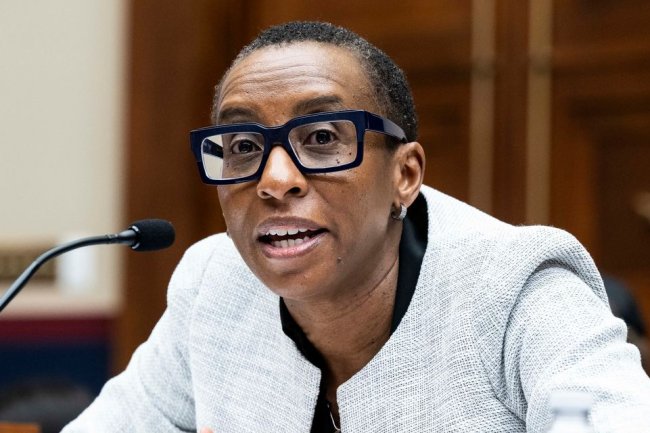Biden Pushes Electric Vehicles, Which Kill Union Jobs
The surprising thing is that the United Auto Workers is going along. By Linda McMahon and James Sherk Aug. 24, 2023 6:35 pm ET Lucid Motors’ electric-car plant in Casa Grande, Ariz. Sept. 28, 2021. Photo: CAITLIN O'HARA/REUTERS Joe Biden calls himself the most pro-union president in history, but he’s pushing policies that would eliminate tens of thousands of United Auto Workers members’ jobs. More surprising, UAW leadership is going along with it. The policy at issue is the Environmental Protection Agency’s recent proposal to require that electric vehicles make up two-thirds of U.S. auto sales by 2032. While these regulations carry serious implications for American drivers—who largely prefer gasoline-powered cars—they’ll have even worse ramifications for auto workers. A gasoline-powered car


Lucid Motors’ electric-car plant in Casa Grande, Ariz. Sept. 28, 2021.
Photo: CAITLIN O'HARA/REUTERS
Joe Biden calls himself the most pro-union president in history, but he’s pushing policies that would eliminate tens of thousands of United Auto Workers members’ jobs. More surprising, UAW leadership is going along with it.
The policy at issue is the Environmental Protection Agency’s recent proposal to require that electric vehicles make up two-thirds of U.S. auto sales by 2032. While these regulations carry serious implications for American drivers—who largely prefer gasoline-powered cars—they’ll have even worse ramifications for auto workers.
A gasoline-powered car has about 2,000 moving parts in its powertrains, whereas a Tesla has 17. That means electric vehicles require one-third fewer workers to assemble than conventional vehicles—and none of the workers who make engines or engine parts. As UAW research director Jennifer Kelly has explained, the “workers who are making engines and transmissions today” will see their jobs “eliminated when we make a transition to electric vehicles.”
In total, the Biden administration’s electric-vehicle push will eliminate a projected 117,000 net auto-manufacturing jobs nationwide. Michigan and the industrial Midwest will be ground zero. Even if the Big Three automakers keep their market share and retool their existing plants, Michigan will still lose at least 25,000 auto-manufacturing jobs. Ohio and Indiana will lose 14,000 and 16,000 respectively.
These estimates are based on fairly optimistic assumptions. Nonunion Tesla dominates the electric-vehicle market, which means that a shift to electric vehicles will almost certainly cause sales—and jobs—to migrate to Tesla. Traditional automakers will likely replace many unionized facilities with new electric-vehicle plants outside the Midwest. Ford, for example, recently announced a massive new electric-vehicle facility in Tennessee.
Forcing Americans to buy electric vehicles means that many UAW-represented parts and assembly plants will close. Those that remain will employ far fewer workers. These job losses have already begun. Stellantis (which owns Chrysler) recently announced layoffs for thousands of union jobs as part of its electric transition.
It isn’t surprising that Mr. Biden is willing to put the energy transition ahead of his supposedly pro-union ideals. Politicians make calculations to prioritize one group’s interests over another all the time. What is shocking is that the UAW leadership isn’t fighting back.
The union knows the electric-vehicle mandate is a threat. Ms. Kelly has publicly warned that “electric, to me, is where the real risk is to our membership.” The union also could have done something about it. It has enormous influence in Michigan and other key Midwestern states. The UAW spends millions on politics and lobbying and has an impressive get-out-the-vote operation.
But the leadership isn’t using any of that power to fight the mandates. As a presidential candidate, Mr. Biden made no secret of his desire to mandate electric vehicles. The UAW endorsed him anyway, and its leadership also endorsed the administration’s Inflation Reduction Act, which included hundreds of billions in electric-vehicle subsidies—directly financing the elimination of union jobs. The bill passed the Senate by a single vote; union opposition could have heavily pressured Michigan’s senators, both of whom are Democrats, to stop it.
After the EPA announced its mandate, UAW leadership proclaimed that the union “supports the transition to a clean auto industry and has been a proud leader in the fight against climate change.” The UAW’s leadership has also made it clear that, while it has yet to endorse a presidential candidate in the 2024 election, a candidate’s views on electric vehicles won’t be a decisive consideration.
Many UAW members feel betrayed. After the Stellantis layoffs were announced, workers at an assembly plant formed a rank-and-file committee. In a statement they explained that “the UAW is working for management instead of us. . . . The auto companies plan to close plants and cut tens of thousands of jobs as part of their transition to electric vehicle production. Instead of defending us and fighting the companies with us, the UAW is keeping this information from us even though half the jobs in industry could be cut.”
If UAW leadership were focused on its members, it would support policies that would protect their jobs. But the union’s leaders aren’t willing to risk a confrontation with environmentalists—a powerful Democratic constituency. Its leadership has instead prioritized political unity, and the Biden administration is no doubt grateful. That gratitude will be little comfort to the auto workers who lose their jobs as a result.
Ms. McMahon is chairman of the Center for the American Worker at the America First Policy Institute. She served as administrator of the Small Business Administration, 2017-19. Mr. Sherk is director of the Center for American Freedom at AFPI. He served as President Trump’s top labor policy adviser on the White House Domestic Policy Council, 2017-21.
One problem: Voters aren't buying it. The Wall Street Journal Interactive Edition
What's Your Reaction?













